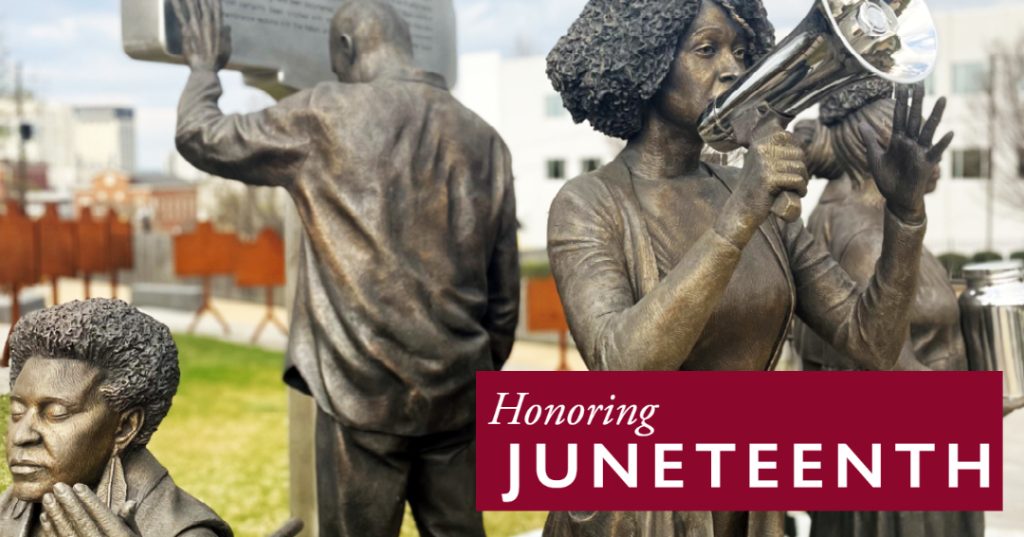 Juneteenth, celebrated annually on June 19, has only been a federal holiday since 2021; however, for people of African descent in the United States, this holiday has been a celebration of African-American freedom for more than 150 years. Also known as Black Independence Day, Juneteenth marks June 19, 1865 when Black people who were enslaved in Galveston, Texas, finally received the message that slavery had been ended, more than two and a half years after the Emancipation Proclamation.
Juneteenth, celebrated annually on June 19, has only been a federal holiday since 2021; however, for people of African descent in the United States, this holiday has been a celebration of African-American freedom for more than 150 years. Also known as Black Independence Day, Juneteenth marks June 19, 1865 when Black people who were enslaved in Galveston, Texas, finally received the message that slavery had been ended, more than two and a half years after the Emancipation Proclamation.
As people in the Episcopal Branch of the Jesus Movement, we are committed to our vision of Becoming Beloved Community, our church’s long-term commitment to racial justice, healing and reconciliation. Josiah Royce, a theologian who put forth the idea of “beloved community” that later leaders and thinkers, most notably Dr. Martin Luther King, Jr., built on and brought to life through action, taught that twin foundational components of “beloved community” are shared memory and shared hope.
The shared memory of our community in Central New York, this country, and indeed our global community must include acknowledging the truth of our past and the ways in which our society in general and our church in particular played a role in the dehumanizing enslavement and ongoing oppression of people of African Descent and other people of color. Only by and with Telling the Truth about Our Churches and Race can we look forward to our shared hope: Proclaiming the Dream of Beloved Community, Practicing Jesus’ Way of Healing Love, and Repairing the Breach in Society and Institutions.
This year for Juneteenth, especially if honoring this holiday isn’t part of your personal traditions, we encourage you to look for meaning-filled ways to honor this important day and faithfully engage in Becoming Beloved Community. Here are some ideas:
For Members of the African Diaspora
If you are a member of the African Diaspora, it’s likely that you already have Juneteenth traditions in your family and community! However, as we work to build a list of resources for Building Beloved Community for the whole church, we offer these ministries for you to consider connecting to and invite you to share other resources you’d like us as Diocese to engage with. Contact Rachel if you’d like more information or would like to share resources you’ve found helpful.
- If you’re not already, you may want to consider connecting with Nap Ministry. From the Nap Ministry website: ” The Nap Ministry was founded in 2016 by Tricia Herseyand is an organization that examines the liberating power of naps. Our “REST IS RESISTANCE” framework and practice engages with the power of performance art, site-specific installations, and community organizing to install sacred and safe spaces for the community to rest together.” You can also connect on Instagram, Facebook, or Twitter.
- Led by the Rev. Canon Ronald Byrd, Sr., The Office of African Descent Ministries within The Episcopal Church “seeks to inspire, transform and empower the people of the African Diaspora to live fully into the Jesus Movement.” This important Ministry honors the rich legacy of the contributions to The Episcopal Church by people of the African Diaspora and offers support and connection opportunities for Black communities and Black theologians. The history of contributions to The Episcopal Church by people of the African Diaspora is long and inspiring. The Church pays tribute to this legacy by supporting and fostering the growth and development of black communities through partnerships that reach across ethnic and racial boundaries, from the Episcopal provinces, dioceses, and deaneries to local worshipping communities. Included among the many offerings from this office available here, is Healing from Internalized Oppression which is focused on an empowering healing process.
- Black Liturgies is a powerful ministry from writer and speaker Cole Arthur Riley through which she “[seeks] to integrate the truths of dignity, lament, rage, justice, and rest into written prayers.” The easiest way to engage with this project is through Instagram.
Learn: History and Legacy of Juneteenth
- The Becoming Beloved Community Initiative has developed a comprehensive resource guide for the History of Juneteenth that includes simple learning opportunities that you can read, watch, and listen to as well as ideas of how to celebrate Juneteenth with your family. Further down the page, you’ll find liturgical resources and resources for families with young children.
- The National Museum of African American History and Culture, a Smithsonian museum, offers this comprehensive and interactive learning journey about Juneteenth.
Pray: Liturgical Resources and Prayers
- Incorporate these prayers from faithinformed.org in your community and personal worship times:
- Almighty God, you rescued your people from slavery in Egypt, and throughout the ages you have never failed to hear the cries of the captives; We remember before you our sisters and brothers in Galveston, Texas who on this day received the glad tidings of their emancipation; Forgive us for the many grave sins that delayed that liberating word; Anoint us with your Spirit to bring good news to the poor, to proclaim release to the captives and recovery of sight to the blind, to let the oppressed go free, and to proclaim the year of your favor; through Jesus Christ our Lord, who lives and reigns with you, in the unity of the Holy Spirit, one God, for ever and ever. Amen.
- Holy and righteous God, you created us in your image. Grant us grace to contend fearlessly against evil and to make no peace with oppression. Help us, like those of generations before us, resist the evil of slavery and human bondage in any form and any manner of oppression. Help us to use our freedoms to bring justice among people and nations everywhere, to the glory of your Holy name through Jesus Christ our Lord. Amen.
Take Action
- Support Black-Owned businesses. There are a number of resources to help find Black-Owned businesses in your local communities and online. One example of this is “Shop Equitably,” a project by Phi Theta Kappa Honor Society at Onondaga Community College that lists more than 20 Black-Owned businesses in the Syracuse area.
- The Episcopal Public Policy Network, part of the Office of Government Relations, has compiled a list of actions to take to continue the work of dismantling racism and white supremacy in our nation and globally. Those actions include urging Congress to pass Voting Rights legislation, urging Congress to End Gun Violence, and urging Congress to advance the study of reparations.
- Contribute to the Absalom Jones Fund. From episcopalchurch.org: “The Absalom Jones Fund for Episcopal HBCUs supports two institutions affiliated with The Episcopal Church since the 1800s: Saint Augustine’s University in Raleigh, North Carolina, and Voorhees University in Denmark, South Carolina. In 1804, Absalom Jones became the first African American to be ordained a priest in The Episcopal Church. His witness to the way of Jesus included efforts to abolish slavery and to lift up all those cast down. He understood that education is the key to empowerment. We honor Absalom Jones by supporting our HBCUs, which prepare the talented leaders who will continue the work of building a more just and humane society.”


